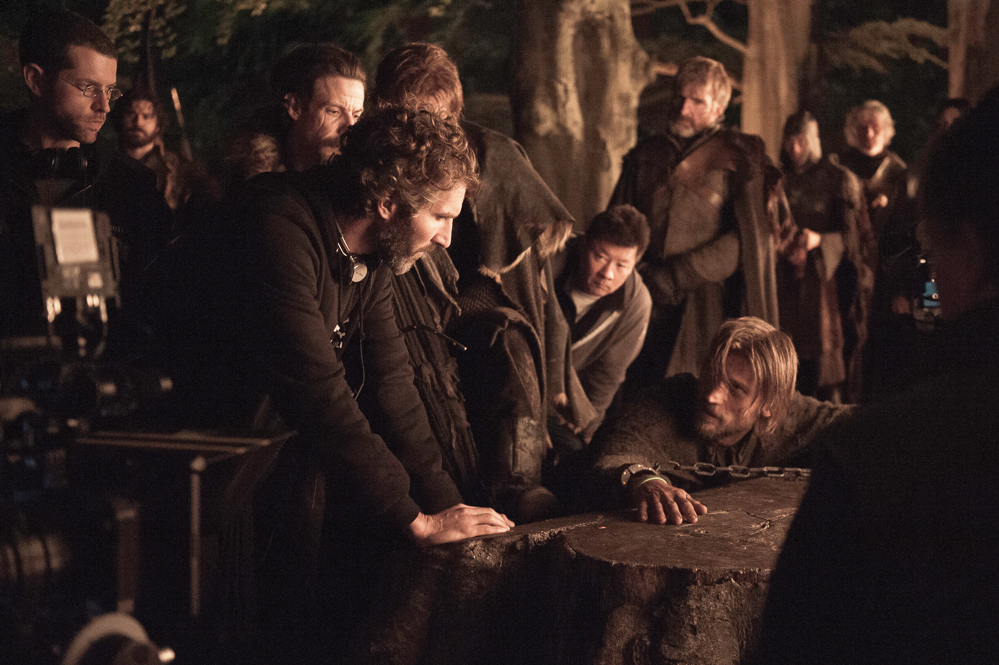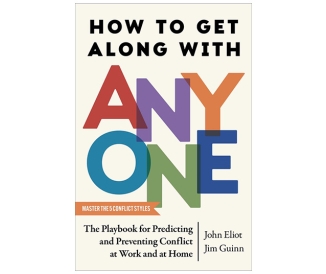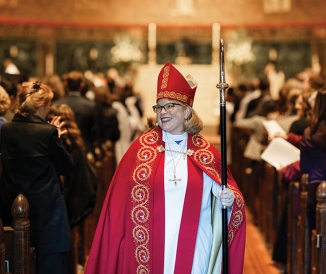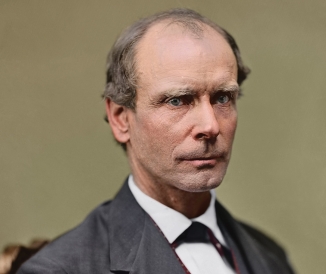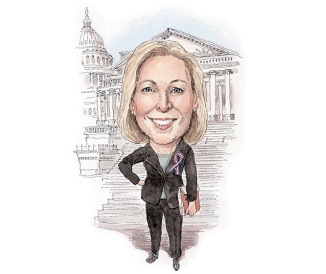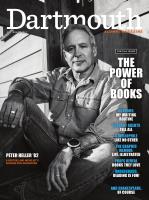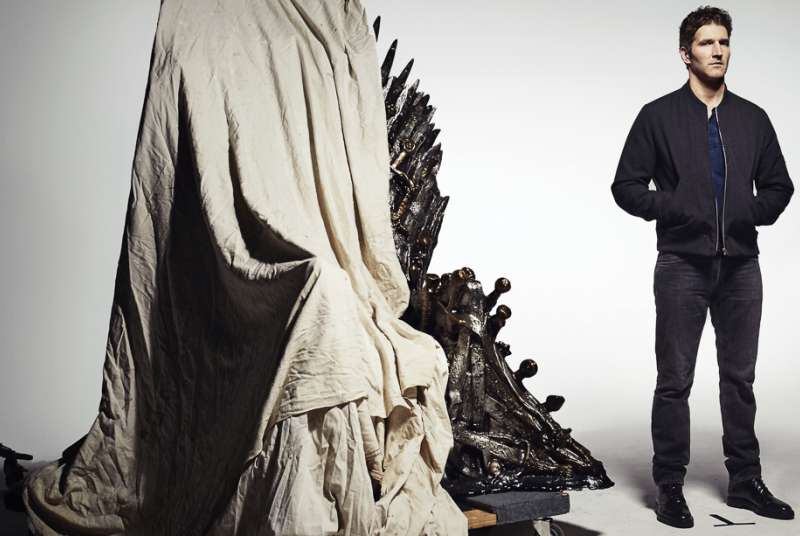
Master of the Game
Tall and trim, with a perpetual three-days’ worth of stubble, David Benioff greets me on one of those sunny, perfect days in Los Angeles at the home where he lives with his wife, actress Amanda Peet, and their three children. Benioff spends months of the year at Game of Thrones shoots around the world—Spain, Ireland, Winnipeg, Morocco—but he obviously relishes being with his family. He writes and works in his office, a converted garage behind the house, where he’s surrounded by promotional posters for the upcoming GOT season, various big-eyed Pop! dolls and more realistic Dark Horse Deluxe figurines of the characters—Daenerys Targaryen, Stannis Baratheon, Jon Snow—and dozens of books. His desk is spare; his chair allows him to write lying down because he has a bad lower back.
At Dartmouth he was a member of Phi Delt and Sphinx. He matriculated as David Friedman, and later took his mother’s maiden name, Benioff, because of all the David Friedmans in Hollywood. Having originally planned to become an English professor, Benioff took a career turn in 2001 after the wild success of his first published novel, The 25th Hour, about a drug dealer’s last day before heading off to prison. Spike Lee directed the film adaption, which Benioff also wrote. A career in screenwriting followed—Troy (2004), Stay (2005), The Kite Runner (2007), X-Men Origins: Wolverine (2009) and Brothers (2009)—as did a book of short stories, When the Nines Roll Over (2004), and a second novel, City of Thieves (2008).
It’s odd to think that all of that success came before Benioff’s truly huge break, when HBO accepted the pitch from Benioff and writing partner D.B. Weiss, an old grad school buddy, to bring George R.R. Martin’s popular and dark fantasy book series, A Song of Ice and Fire, to the screen. It is of course now known as the most critically acclaimed and popular series in television history, and its seventh and penultimate season premieres July 16.
You told The Guardian in 2003—in reference to converting your book The 25th Hour into a screenplay—“If the choice ever boiled down to keeping faith with the novel or doing what was best for the script, I chose the latter.” You faced that choice quite a bit in converting George R.R. Martin’s books into TV. As a novelist isn’t that heresy?
No, I don’t think so, because once you make the decision to sell your novel and have it adapted, I think you understand that there are going to be compromises and there are going to be changes made. I’ve seen a lot of adaptations that run into trouble by being too faithful to the book and they get kind of hamstrung by that.
It’s something that we told George a long time ago: For this to work, we have to make choices that are sometimes going to deviate from your intentions. Then there are a lot of things that work in prose that just wouldn’t work on screen, and part of that is just the nature of the beast. In George’s books so much of the story takes place in the characters’ minds. That’s one of the weaknesses of television compared to fiction—what people are thinking cannot be conveyed as easily, other by than having long voiceover monologues, which are boring.
There are certain scenes that work so wonderfully in the novels that just wouldn’t on the show and other scenes that are pretty much as they are on page. The Red Wedding was very faithful to what happens in the book.
But now you’ve not only caught up with Martin’s books, you’ve passed them.
Right, so now we don’t have a choice. It’s not even a question of, well, maybe we should be faithful to the scene or not. It’s we don’t have the scene. About three years ago we realized we were probably going to catch up based on his rate of progress and our rate, and we visited him and we got a sense of where he was going. George always says there are two kinds of writers: gardeners and architects. The architects are the ones who create blueprints and really serious outlines and have a sense of exactly where the story is gonna go and then they create the edifice based on the blueprint.
Gardeners are more organic about it. They plant the seeds and then they sort of see what blooms. And he is a gardener, by his own admission. And that works beautifully for his novels, obviously, but for us, we don’t really have a choice. As TV writer and producer, you have to be an architect. There’s no organic way of doing it.
“As TV writer and producer, you have to be an architect. There’s no organic way of doing it.”
You have to have the last episode and the penultimate episode of the season be big crescendos.
And not only that. We have to have the entire season written before we start shooting, because we don’t shoot in order. We shoot it like a movie. We might shoot a scene from the last episode on the first day, and it takes so much preparation for every scene.
So right now we’re outlining the final season. I’d say 90 percent of it was stuff that we knew was going to happen. It’s just necessary for us to make the series work. Otherwise, there are just too many plot threads, and the idea of trying to bring it all together at the very end would make me go crazy because if you try to figure out how to end this story at the end, it would never work.
Let’s talk about your writing career. Your first book was The 25th Hour.
First published book. There were two novels before that which were not published because they sucked. The first one I started at the end of senior year at Dartmouth. I had a senior fellowship, so I didn’t have to take classes. I just met once a week with my tutor, Ernest Hebert, who was a great Dartmouth English professor and a wonderful novelist who wrote The Dogs of March and a lot of other great books. It was an incredible learning experience, but I kind of knew that the book wasn’t ready. I didn’t even try to get that one published because it was a 21-year-old’s novel.
And then in my 20s, for about five or six years, I wrote a second novel, and that one I did try to get published. I got an agent out of it, which was great, but I got rejected by I think every publisher in America, as far as I can tell.
The other good thing that came out of that scarring experience was the rejection letters. The agent, Owen Laster, sent me this envelope filled with like 32 rejection letters. I got them all in one fell swoop and maybe 26 of them were form letters, but there were about six where the editors had taken the time to actually write something, which I’m really deeply grateful for. They didn’t have to do that. And there was a common theme throughout these letters, which was: We like the writing, we like the characters and the dialogue, but the story is kind of all over the map. It just feels very sloppy.
So I realized I really didn’t know how to write a book. I didn’t know how to tell the story and I needed something much shorter, you know, something much more compressed. And I just figured since this was my weakness as a writer at this point, the easiest thing for me to do would be, instead of trying to write something that took place over the course of 40 years, like my novel did, write something that took place over the course of one night, and that compression would kind of force me to be more organized.
And then I remembered the story that I’d written at Dartmouth that had been published in—what’s the name of our literary magazine?
Stonefence Review?
Yes. This little story that ends with one friend asking his other friend to beat him really severely because he’s going to prison the next day and he doesn’t want to be too pretty because he’s a young pretty boy, and so that was kind of the inspiration for writing The 25th Hour, and that was the first one to get published.
After getting rejected by every major publisher in the U.S., it finally got picked up by a very small New York publisher that gave me $7,500 for it, which was great. A small publisher named Carroll & Graf picked it up and a guy named Kent Carroll decided to take it on, and Kent was great and he rejected my original title, which I don’t even remember—I probably do remember but I don’t want to say.
What was it?
Oh, God.
There are good lessons here for young people about perseverance and also listening to wise elders.
Maybe it was Fireman Down? Something like that. It really didn’t make any sense at all. I think the deal was, “I will publish this novel but you have to change the title,” and I said, “Great, let’s do it.”
Is that something that you’ve thought about a lot? What you would do if you had only one day before you had to go to prison?
I think about going to prison a lot.
Why?
I don’t know. I guess it’s just like a phobia I’ve had for most of my life.
Going to prison? You seem fairly law abiding.
I am fairly law abiding and you know, I grew up in a very safe neighborhood in Manhattan and….
And you’re a big-time Hollywood producer/director who’s happily married with three children….
And it’s not like I have fantasies of murdering people. It’s not like I think I’m going to get caught killing someone and go to prison. It’s just, I don’t know, maybe it was because I saw too many prison movies in my youth or something, but it’s just one of those random fears. When I’m sitting in the movie theater I’m always afraid that the person behind me is gonna shoot me in the back of the head. So who knows where this stuff comes from.
The tagline for the movie 25th Hour is “Can you change your whole life in a day?” Have you ever had a day that changed your whole life?
I had the blind date with Amanda, which definitely changed my life. The moment that changed my professional life was when I read The Mysteries of Pittsburgh by Michael Chabon.
Five years after Dartmouth, I was living in Wyoming, working in Jackson Hole as the graveyard shift deejay on KMTN, the local radio station. I barely talked. I would deliver the black ice advisory for the town paths or whatever. While I was out there I read The Mysteries of Pittsburgh, loved it and then looked at the back cover and it said Michael Chabon had got his M.F.A. at UC Irvine. I’d never heard of Irvine before, but I was in the process of applying for an M.F.A., so I applied to Irvine based on reading that and that’s where I ended up going and that’s why I moved to Southern California and have stayed ever since.
And that changed everything. I don’t think I would have gotten into screenwriting and I wouldn’t have met my wife, and everything that’s happened since then, I really basically blame on the back cover of The Mysteries of Pittsburgh.
So it wasn’t a day that changed your whole life. It was like 10 seconds. Do you want to make your second novel, City of Thieves, into a movie?
I don’t know. I’ve kept the rights to myself, because if I ever did do it, I’d want to do it myself. It took me forever to write. I had the first line for that book seven years before I actually wrote the rest of it.
What was the first line?
“My grandfather, the knife fighter, killed two Germans before he was 18.” And so I had written maybe the first line, first paragraph and then just figured out the rest. So the thing for me about adapting it at this point is I would have to have that excitement back again, you know, the storytelling excitement because, at this point, I feel like I’ve already told that story.
And now you and your writing partner D.B. Weiss are going to write, produce and direct Stephen Hunter’s Dirty White Boys?
We announced that. I don’t think there’s a done deal yet.
Has being married to an actress changed the way that you write and direct and produce?
Definitely. First of all, it’s just hearing her talk about working with directors or working with writers and what works with her and what doesn’t work with her. One of the things that’s really wonderful about writing television as opposed to movies is that you know whom you’re writing for and the longer the series goes, the better you know those people you’re writing for. There’s a real, just wonderful symbiotic relationship.
With Amanda a lot of it is just why a line won’t play or why a line is really hard to deliver, which sometimes is confusing for a writer because the line might look great on paper and then it’s really useful to have an actor say it’s a really tough line because X, Y or Z.
You don’t think you would have the same sensitivity dealing with actors if you weren’t married to one?
I think I’d probably find that more frustrating if I didn’t see the other side of it every day and hear how frustrating producers and writers and directors can be, and so being in a house where you kind of get a sense of all different sides, it’s encouraging.
Let’s talk about one of the darkest moments in Game of Thrones, the hideous wedding-night rape of Sansa by Ramsay Bolton. Was it a difficult decision to do that? Did you have any idea that there would be something of a backlash?
For sure, because there had been a scene in the previous season with Jaime and Cersei, where it was not quite as violent but was very much a non-consensual sex scene, and there was a massive uproar about that. And this was darker.
It’s a show with dragons, so people might think, well, it’s a fantasy, therefore, it should be more kind of PG. But it’s not. It’s supposed to be a dark mirror to our world and a dark mirror to our medieval world, which was a horrific place for women. So I believe that this is what would have happened to Sansa on her wedding night, and all the writers did. So it was a brutal scene to watch for us and a brutal scene to shoot on the day, but I felt it was right for the story.
“It’s exciting to me that we’re at the end of the story. We’re ready to end it.”
What’s it like to see characters and scenes that you have written become part of the culture to the extent that people bring out the GIFs of the “Shame, shame” scene, with Cersei walking through the streets?
It depends on the context. It’s sometimes funny. But the “Shame, shame” thing—those are religious fanatics shaming Cersei through the streets. I don’t admire what they’re doing, so sometimes when they’re doing “Shame, shame” to people they dislike, I feel like the message gets a little bit twisted. Whatever position one has on [Education Secretary] Betsy DeVos, are you sure you want to be playing the religious fanatic? (Laughs)
Chris Christie has been compared to Reek.
He was? He’s tortured by Trump and then loses?
Right. You have two seasons left. We’re going to find out much more about Jon Snow’s mother, I assume?
We will.
Is it going to be tough to say goodbye to the show, not only to the characters but also to the experience of, “Hey, I’m gonna go live in Belfast for two months with a $100-million budget?”
I think it’s time. We’re ready to end it. When we first pitched this to HBO, part of what we were excited about was the notion of telling a really grand story from beginning to middle to end. We got very lucky in the sense that people watched it and we were working at a certain time in television where cable had these big budgets and enabled us to do this incredibly expensive, very visual effects-heavy show, which I don’t think at any other time in history could have been done, just technologically.
So it’s exciting to me that we’re at the end of the story. There’s no desire on our part to add on a year because the show’s going well, and we love our jobs. When we shoot that final day and we know we’re saying goodbye to the actors—not the last time because I hope we’ll see them again, but we’re not going to have them all together the same way—it will definitely be emotional.
Jake Tapper is a DAM contributing editor.
A Few of His Favorite Things
The creative muses of David Benioff
Actress with Whom He Hasn’t Worked
Amanda Peet
Current Favorite TV show
Rick and Morty. The funniest, smartest show on television, with Atlanta a close second.
Most Consistently Excellent TV Show
Breaking Bad. Not a single bad season. Don’t even remember a bad episode. A remarkable run, from the brilliant pilot to the perfect final shot, by the inimitable Vince Gilligan.
Favorite TV characters
The Sopranos. Who will ever top David Chase, creator of Tony Soprano, Carmela Soprano, Paulie Walnuts, Christopher Moltisanti, etc.?
Movie
Le Notti di Cabiria (1957, Federico Fellini). Giulietta Masina’s unforgettable portrayal of an impoverished prostitute in postwar Rome is sometimes funny and sometimes heartbreaking, but always entrancing. Acidic dialogue, gorgeous cinematography and a haunting score by the great Nino Rota—most famous for composing The Godfather theme—combine to make this one of the few movies I can watch again and again without ever growing bored.
Book
Lonesome Dove has long been my father’s favorite novel. For some reason, I never read it until I was 46. It’s always annoying to realize your dad was right all along.
Professor
Ernest Hebert, another guy who changed my life.
Class
“Introduction to Creative Writing.” The first three times I applied to Hebert’s class, he rejected me. Finally, the fourth time around, he took pity. I don’t think my writing had gotten any better. Maybe he just admired my stubbornness.

